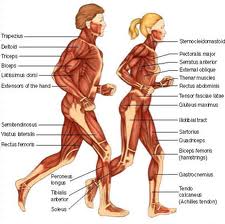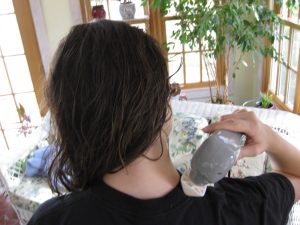- About
- Herbs
- Methods
- Issues with…
- Imbalances in…
- Client Info
- Store
Muscles
Muscles contract and relax under control of the nervous system. Skeletal muscles are the ones body builders emphasize, but the digestive tract and the heart are 2 other important muscles groups which are more critical to survival and are discussed elsewhere.
The Organ/Muscle Correspondence post may be of interest to those seeking the underlying organ cause of a specific joint problem.
Muscle Issues
1. Joint problems are usually caused by tight muscles that cross that joint. Lots muscles
cross each of our joints. When you want to move a specific joint, say flexing your foot, many muscles work in concert to execute that motion. Well, they are supposed to work in concert – some muscles relaxing in a controlled manner and others contracting. If certain muscles have impaired circulation they become weak on contraction, or, if they have impaired drainage they become a little stiff on relaxation, creating not so great a concert. You may not even notice this at first but the uneven tension across the joint causes the joint to move off course. Repeated movement wears the joint. Wha la, joint problem caused by muscles!! Now if you have taken joint rebuilders in the past like Glucosamine and Chondroitin, and they helped, you are in this category, but you are not addressing the root problem, because you will have to continue rebuilding what you keep wearing out. Many have found that MSM (#4059-4) is helpful for joint pain as well as muscle stiffness but I believe this actually helps the tendons by benefiting the liver. Take 2B, 2D and reduce with symptoms. MSM has also proven beneficial for acid reflux and allergies (which also relate to liver insufficiency) so if you have all of these start off with 3B, 3D and reduce with symptoms. AND then look for and address the underlying cause. A common sense approach is to use a vibration massagerto relax the
muscles on either side of the involved joint. That link will also show how to address common problem areas.
2. Weak or wasting muscles OR inability to increase muscle mass. These muscle problems are often caused by medications, in particular statins (cholesterol meds) or acid blockers, but other meds may also be involved so do your homework and investigate the side-effects of any medication. That said, the next contributors to these problems are poor digestive function, followed by impaired blood supply. These two documents fully address these contributions. In Traditional Chinese Medicine, the muscle mass is fortified by the stomach and spleen. These two organs are responsible for the ‘material form’. To this end I have seen the Concentrated Chinese Spleen Activator (#1070-5) put mass on young and old alike. It is important to use the concentrated version here because it is so much easier to digest for these weakened stomach/spleen folks.
3. Chronically stiff muscles are caused by acid retention within the muscle. The stiffness I’m referring to is the ‘stiffness with inactivity’ that lessens with ‘getting up and moving around’. The remedy for this situation is to first make sure circulation is open to the kidney and then supply Combo Potassium (#3673-1) 2B, 2D to the body to escort the acids out through the urinary tract. Then gentle rebounding will help to minimize the accumulation of acids that give that stiff feeling. I have had clients report that the Combo Potassium even reduced the stiffness in the bowel muscle so that more normal peristalsis returned. But sometimes opening the circulation and lymphatic drainage completely resolves the problem.
4. Chronically tight or contracted muscles indicate chronic stress and a chronic need for relaxing nervines, magnesium, circulation or massage. Tight, contracted muscles don’t improve right away with movement the way ‘stiff’ muscles do. Sometimes the muscle is so tight that blood is not able to enter the muscle. Many people report great results self-massaging Tei Fu Lotion (#3538-5) lotion into the muscle to get it to let up. Using a vibration massager is a great aide in shaking loose tight tissue. If Magnesium (#1786-6) 1B, 1D (this dose can be tripled but watch for loose bowels) and self massage do not work, the next step is your friendly kinesiologist (person who does muscle testing) to help you find any underlying imbalance contributing to the muscle tightness. Such an imbalance is likely contributing to other problems within the body. See Basic Principle #5 part 2. Another option is an experienced deep tissue massage therapist.
5. Twitching muscles (involuntary movements) signal a nerve problem not a muscle problem. Minerals are sedative to the body and normalize nerve conduction. Although some naturopaths would recommend calcium for this, from my experience with my clients, the human body prefers plants instead of rocks. To this end the Herbal CA ATC (#826-3) will supply many kinds of minerals in a plant based form which is also easy to digest since most cellulose has been removed. If Herbal CA ATC 1B, 2D does not improve the condition after 1 week, then T/R Valerian (#721-1) usually will. I’ve had lots of good results with it. Take 1B, 1b and reduce with symptoms. More insights into the problem are in the Nervous System page.
6. Restless muscles signal circulation impairment. Restlessness is not the same as involuntary movements. Twitching is often unconscious quick jerk-like movement. Restlessness can occur unconsciously but, if so, it is a learned behavior to stop the ache from a decreased blood supply. More often people report that they just have to move – they cannot be still because their muscles start hurting. Movement increases circulation. To support the circulation and oxygenation of the muscles, consider Cardio Assurance (#553-2). Since the heart is a muscle, restless legs can be a harbinger of heart problems. More insights into this problem are in the Circulation page and the Sleep page.
Pharmaceutical Phactoids – In the unlikely event that your doc failed to warn you that…
Tendon Rupture, a Little-Known Side Effect of Antibiotics
Here’s one more for the long list of tales about how the drugs we take to heal us can end up causing harm: The FDA has announced that it will now require a boxed warning (its strongest warning on a label) about the risk of tendonitis and tendon rupture associated with use of fluoroquinolone antibiotics — such as ciprofloxacin (Cipro) — along with mandated distribution of a newly detailed medication guide to be dispensed by pharmacies with the drug.
Fluoroquinolones such as ciprofloxacin (Cipro and Proquin XR), gemifloxacin (Factive), levofloxacin (Levaquin), moxifloxacin (Avelox), norfloxacin (Noroxin), and ofloxacin (Floxin) are commonly prescribed for upper respiratory, gastrointestinal and urinary tract infections (UTIs).
FDA-approved labeling for these drugs mention the risk of tendonitis, but clearly public awareness is not widespread as the FDA continues to receive reports of tendon-related adverse events related to them. The FDA has received more than 400 reports of tendon rupture plus more than 1,200 of tendon problems, and, it’s possible this represents only the tip of the iceberg since it’s suspected that just a small fraction of cases are reported to the FDA.
Although anyone who takes fluoroquinolone drugs is at risk, the likelihood of having tendon problems is higher if you are over 60, taking steroids (corticosteroids), or are a kidney, heart or lung transplant recipient.
Symptoms of tendonitis include pain, swelling, inflammation and tearing, all found most commonly in the Achilles tendon, shoulder or hand. Ruptures can occur without warning (some patients report feeling a snap or pop soon after starting treatment), but more typically patients feel pain or inflammation for days or weeks before the tendon actually ruptures. Another symptom is easy bruising right after an injury in a tendon area. These problems can occur during or after taking fluoroquinolones — even months later, according to the FDA.
If you develop tenderness or other such problems, avoid exercising or overuse of the area. Any such symptoms should be immediately reported to your doctor in conjunction with your request to be switched to another antibiotic of a different class. Most serious problems may be avoided if you pay attention to the first signs of trouble.
Source(s): Sidney Wolfe, MD, Director of The Health Research Group at Public Citizen and editor of www.worstpills.org, in Washington, DC.
Parkinson’s–Statin Link
New research has reported a very strong link between Parkinson’s disease and Statin use (Reuters. 1.15.07). At the University of North Carolina, researchers found a 350% increase risk of Parkinson’s in those with low LDL’s versus those with higher LDL levels. Further research is being done to confirm or refute this link. One of the side effects of statins is brain fog. [Yeah, we’ll keep studying this, huh. Meanwhile I heard a medical doctor report that statins make women dumb. Hmmm. Maybe too dumb to know what is happening to them. That’s sick.]
Statin ALS (Lou Gehrig’s Disease) link
The World Health Organization drug-monitoring center had found an unexpected association between statins and ALS-like syndrome (Drug Safety, June 2007). [If you are on a statin be sure to report any experiences of stumbling, falling, slurring speech, or difficulty swallowing, muscle pain or weakness. These signal nerve/muscle degeneration.]
©Pat Block ND 2007
Consider this…..
I have learned more from very sick people than I have from double-blind, placebo-controlled, cross-over studies. My sick clients taught me how to get them well - things that even my teachers didn't know. I have such smart clients.
** Important Warning **
Nothing on this site is FDA approved. Nothing I write here is intended to be medical advice. Follow my recommendations at your own risk. Results may vary, and blah, blah, blah. So if the required warnings have not scared you away, then you have a chance. I'm reporting here what kinds of approaches actually helped very sick people get well, AND the kinds of things that actually made them sick (and it usually isn't lack of exercise, weight, menopause or smoking - it is the underlying cause of all those things.)
** Important Posts **
- ► I Went to the Doctor and the Doctor Said…
- ► THE Technical Info on the Herbs
- ► Uh oh, what was I supposed to do when I think I’m getting sick?
- ► Fatigue: The Mother of All Disease
- ► Uh oh, my kid is sick again
- ► Childhood Disorders (ADHD, Behavior Disorders, etc.)
- ► Too Busy to do Healthy
- ► Of Drugs, OTCs and Black Electrical Tape
- ► Pat’s book – Spiritual Disciplines for Physical and Emotional Healing
In case you were wondering..
B=Breakfast, L=Lunch, D=Dinner, b=bedtime. Make sure to read What to Expect on an Herbal Program (in the Herb menu) before beginning. Dosages given are about what my clients benefit from. You may be different. Begin slowly and see how each recommendation benefits you.** Join the Discussion **
This website is a work in progress and a sharing tool. Feel free to use the comment forms to share your tried and true 'something natural'.





